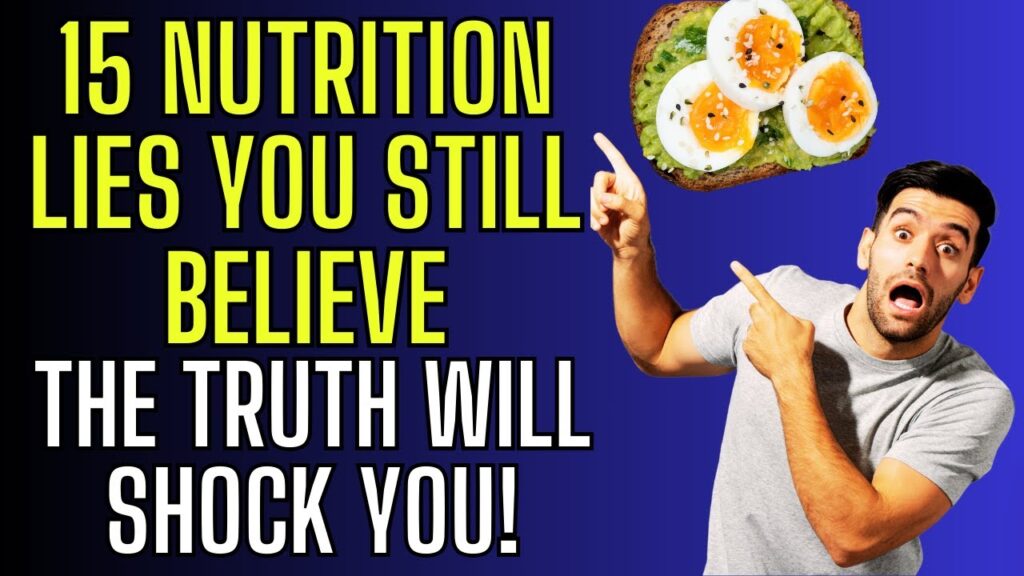
Are carbs making you fat? Should you avoid eating late at night? And does microwaving your food really kill all its nutrients? 🤔
When it comes to nutrition, myths spread faster than facts. But following misinformation can harm your health more than help it. That’s why we’re setting the record straight and busting 15 of the most common nutrition myths you’ve likely believed for years!
Let’s dive into the truth behind the food headlines—and change the way you think about healthy eating forever.
🔥 MYTH #1: Carbs Make You Fat
The Truth: Carbs aren’t your enemy—excess calories are.
Whole carbs like brown rice, quinoa, oats, and fruit are loaded with fiber, vitamins, and long-lasting energy. It’s the refined, sugary carbs (think white bread and pastries) that contribute to weight gain.
✅ Healthy carbs fuel your body and brain—don’t cut them, choose wisely!
🔥 MYTH #2: Eating Fat Makes You Fat
The Truth: Your body needs healthy fats to function!
Fats from sources like avocado, olive oil, nuts, and seeds are essential for brain function, hormone production, and nutrient absorption. The real problem? Trans fats and heavily processed snacks.
✅ Embrace good fats—ditch the junk fats!
🔥 MYTH #3: Juice Cleanses Detox Your Body
The Truth: Your liver and kidneys do the real detoxing.
Juice cleanses lack protein, fiber, and essential nutrients. While you might lose water weight, it’s not sustainable or healthy.
✅ Instead, eat whole foods, drink water, and support your body’s natural detox systems every day.
🔥 MYTH #4: Egg Yolks Are Bad for Your Heart
The Truth: Egg yolks are nutrient-dense and heart-friendly for most people.
They contain choline, B vitamins, protein, and healthy fats—all vital for brain and heart health. Unless you have a specific condition, you don’t need to skip the yolk!
✅ Enjoy whole eggs as part of a balanced diet.
🔥 MYTH #5: Everyone Should Avoid Gluten
The Truth: Gluten isn’t harmful unless you’re gluten-sensitive or have celiac disease.
Whole grains like barley, wheat, and rye are rich in fiber and nutrients that many gluten-free processed foods lack.
✅ Unless medically necessary, gluten can be a healthy part of your diet.
🔥 MYTH #6: Eating Late at Night Causes Weight Gain
The Truth: Timing doesn’t matter as much as total calories and food quality.
It’s not when you eat, but what and how much you eat. Mindless snacking on junk late at night leads to weight gain—not the time on the clock.
✅ Opt for healthy evening snacks like Greek yogurt or almonds if you’re hungry.
🔥 MYTH #7: Microwaving Kills Nutrients
The Truth: Microwaving actually helps preserve nutrients better than boiling.
Since it uses less heat and water, it often retains more vitamins in veggies like broccoli and spinach.
✅ Microwave with confidence—your nutrients are safe!
🔥 MYTH #8: Fresh Produce Is Always Better Than Frozen
The Truth: Frozen fruits and veggies are just as nutritious—sometimes more!
They’re flash-frozen at peak ripeness, locking in nutrients that may degrade during shipping and shelf time for fresh produce.
✅ Keep frozen produce on hand for convenient, budget-friendly nutrition.
🔥 MYTH #9: More Protein = More Muscle
The Truth: Protein needs strength training to build muscle.
Excess protein won’t automatically turn into muscle—it just becomes extra calories. Your body also has a limit to how much protein it can use at one time.
✅ Balance your intake with regular resistance exercise for the best results.
🔥 MYTH #10: Coffee is Dehydrating
The Truth: Coffee does contain caffeine, a mild diuretic—but your body adjusts.
Moderate coffee consumption still counts toward your daily fluid intake. Unless you’re drinking excessive amounts, it won’t dehydrate you.
✅ Enjoy your morning brew—just stay hydrated overall.
🔥 MYTH #11: Red Meat is Always Unhealthy
The Truth: Unprocessed, lean red meat in moderation can be healthy.
It’s rich in iron, B12, zinc, and high-quality protein. The real concerns are processed meats (like bacon and sausages) and eating red meat in excess.
✅ Choose grass-fed or lean cuts, and pair them with veggies.
🔥 MYTH #12: Eating Every 2–3 Hours Boosts Metabolism
The Truth: Meal frequency doesn’t significantly impact metabolism.
Your total calorie and nutrient intake matters far more. Whether you eat three meals or six small ones, the metabolic effect is about the same.
✅ Eat when you’re hungry, and focus on balanced, nutrient-dense meals.
🔥 MYTH #13: Sugar-Free Means Healthy
The Truth: Sugar-free doesn’t always mean good for you.
Many sugar-free snacks are packed with artificial sweeteners and additives that may harm gut health and spike cravings.
✅ Stick to natural, whole foods instead of overly processed “diet” alternatives.
🔥 MYTH #14: All Calories Are the Same
The Truth: Calories from whole foods fuel your body differently than junk food.
100 calories of broccoli isn’t equal to 100 calories of soda. Whole foods provide fiber, protein, vitamins, and minerals—while processed foods often lack nutrition and leave you hungry.
✅ Nutrient density matters more than just calorie count.
🔥 MYTH #15: Vegan Diets Lack Protein
The Truth: Plant-based diets can be rich in protein—if planned properly.
Lentils, beans, quinoa, tofu, tempeh, nuts, and seeds all contain plant protein. Combine them smartly to get all essential amino acids.
✅ Vegans can thrive with diverse, protein-rich plant foods.
💬 Final Thoughts: Knowledge = Empowerment
How many of these myths had you believed? Nutrition doesn’t have to be confusing—but it does need to be based on facts, not fads. By ditching the myths and embracing science-backed truths, you can fuel your body smarter, live healthier, and feel more empowered in every meal you eat.
Have questions or a myth you want busted? Drop it in the comments—we’d love to help you separate fact from fiction!
For more real nutrition tips and healthy living advice, visit us at Health and Wellness Bytes — where wellness meets wisdom!

